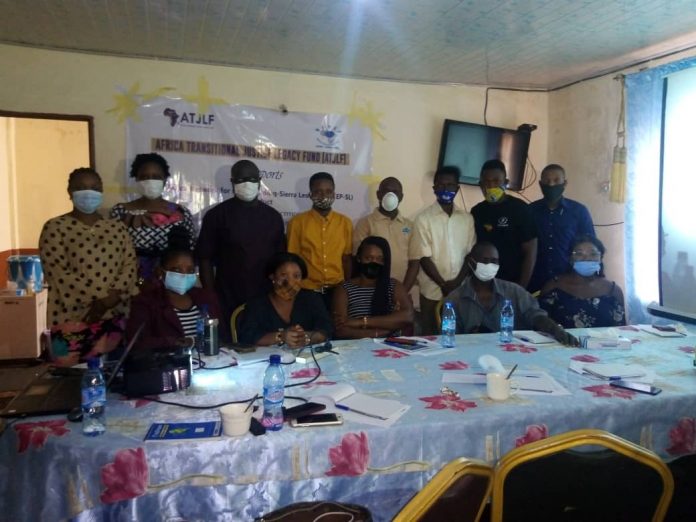By Edward Vamboi
The West Africa Network for Peacebuilding (WANEP) on Thursday 4th February 2021 organized a day’s training workshop for 10 media practitioners in Freetown.
The project titled, ‘Join Han’ to supporting victims and community initiatives to access reparation and institutional reform and in the market place for justice and accountability as well as enhance cohesion in Sierra Leone seeks to strengthen the use and application of alternative dispute resolution methods to enhance peace and local accountability at community level.
In her welcome and overview of the project, the Program Manager of WANEP, Mrs. Mariama Jusu Korya enlightened that the overall objective of the project is to enhance the capacity of victims of the civil war to engage the State in the implementation of a transparent and inclusive reparation program in the country and to ensure that the processes and procedures of the traditional dispute resolution are in line with basic human rights standards.
She furthered that the project seeks to particularly contribute to establishing and expanding spaces for women, especially market women, to access gender-responsive needs in addition to ensuring that the processes and procedures of traditional dispute mechanism are in tune with basic human right standards using traditional dispute resolution systems through increased understanding and raising awareness by building the capacity of traditional leaders who are often caught up between being the perpetrator and the ones executing the laws as well as build on the capacity of war-affected and wounded victims to interact with the State and enable them participate in reparations programs.
Also, the project is being implemented in the Western Area Rural and Koidu City, Kono District and by the end of 2021, it aims to strengthen the capacity of women leaders (including market women) to effectively dispense justice through alternative dispute resolution in their communities, enhance the capacity of victims of the war to engage the State in the implementation of reparations and develop the capacity of traditional leaders to effectively work with their communities in addressing grievances and promoting social cohesion.
Eighteen years after the official end of the civil war in Sierra Leone, its reparation program is in trouble. While the international community provided much of the support in the beginning, the program is now largely left to itself. The scale of suffering of the war victims has continued to escalate daily. Sierra Leone’s reparation program challenges those who pay attention to think about sustainability.
Among others, the project will also look at pensions, free healthcare, educational benefits and much more for survivors.
Government reluctantly agreed to implement the recommendations but failed to take any action for four years. It required pressure from the country’s biggest survivor organization, the Amputee and War –Wounded Association to among others provide pensions, free housing and healthcare, educational benefits and much more.
According to the lead facilitator of the training workshop, Dr. Isaac Sowa of the Mass Communications Department at Fourah Bay College, University of Sierra Leone, Sierra Leone’s Truth and Reconciliation Commission (CRC) and the Special Court for Sierra Leone as the preferred transitional justice choices adopted to address the legacy of past human rights violations committed during the eleven years civil war.
Dr. Sowa continued that the two traditional justice tools emerged out of exhaustive nature of fighting between the Government of Sierra Leone and the Revolutionary United Front (RUF). This subjected the belligerents to grab the most comprehensive available alternative option that set the stage for Transitional Justice mechanisms after serious cost-benefit analysis. The country adhered to proponents’ claims that accountability measures are needed for societies to move on from violent past to begin rebuilding sustainable peace and development.
The TRC identified the lack of public access to justice as both a cause of its decade-long civil war and a factor that helped sustain it. This explains that Sierra Leone’s complex and chequered political history is reflected in its present ineffective justice system and lack of respect for the rule of law. Likewise, eighteen years after the end of the civil war and the closure of the accountability mechanisms, wounds are still fresh in the minds of victims, facilities underprovided; capacities are low, while the country is still confronted with several justice sector challenges.
There is also an overwhelming perception and expectation of the local populace regarding the political evolution that has taken place after the implementation of some of the imperative recommendations of the TRC.
There are several indications to also affirm that claim that Sierra Leone is still not fully recovered from the legacy of the civil war. This also implies that the country is also marked by a largely unaddressed legacy of violations of human rights and international humanitarian law. Sierra Leone remains profoundly affected by its past, as well as deeply divided along and across community lines with mutually exclusive understandings and interpretations of the past. It is thus in need of a comprehensive, inclusive, gender-sensitive, victim-centered and consultative process of transitional justice.
The WANEP National Coordinator, Dr. Isata Mahoi asserted that the issues of transitional justice and Alternative Redress Mechanism are not only for WANEP but a national campaign reiterating that transitional justice is important but that much attention is not paid to it and urged all to learn from the past and make amends for the future.
She went on to state that the National Commission for Social Action (NaCSA) has closed the reparations program that they are advocating for its reopening for amputees to live a decent life reiterating that we have to change the narrative by ensuring that government lives up to its responsibilities.
The highly interactive training was climaxed with the question and answer session, group and individual work.




